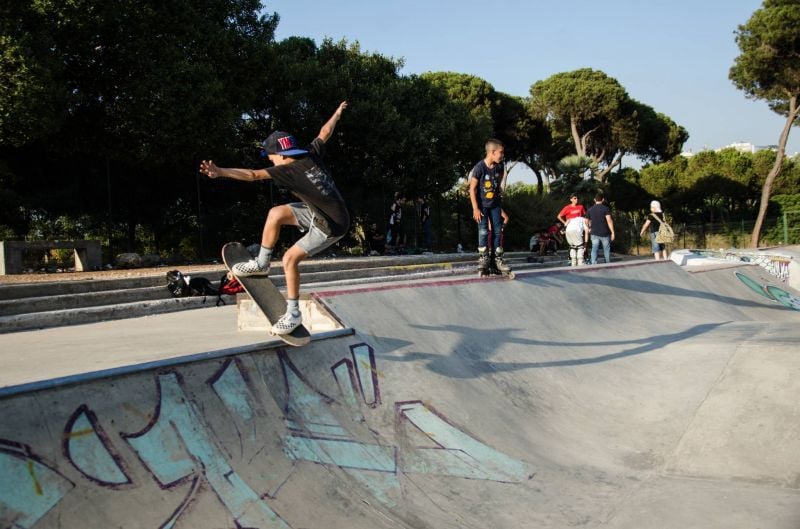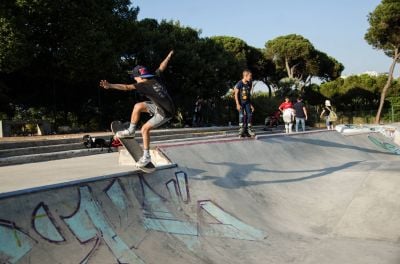
At the Snoubar skatepark in Horsh Beirut. June 30, 2023. (Credit: Emmanuel Haddad/L'Orient-Le Jour)
Amid Beirut’s limited public spaces, a haven exists for young skaters.
At the Snoubar skatepark, they find solace in motion, their boards becoming vessels to escape the relentless hardships of the crisis and a means to break free of discrimination — for a little while.
In July 2021, Lebanon welcomed its first-ever public skate park — a sprawling 1,100-square-meter facility situated in Horsh Beirut, on the Tariq al-Jadideh side.
A fence, however, separates this space from the expansive 330,000 square meter green triangle. The fence serves as a symbol of the indirect spatial discrimination endured by the residents of this working-class neighborhood and the neighboring refugee camp.
In the wake of the devastating 2020 Beirut port explosion, Matze, a German expatriate residing in the shattered capital, joined the collective endeavor to clean up the shattered glass debris and mend the damaged apartments in the neighborhoods of Gemmayzeh and Mar Mikhael.
 At the Snoubar skatepark in Horsh Beirut. June 23, 2023. (Credit: Emmanuel Haddad/L'Orient-Le Jour)
At the Snoubar skatepark in Horsh Beirut. June 23, 2023. (Credit: Emmanuel Haddad/L'Orient-Le Jour)
Several months later, he returned accompanied by the German NGO Make Life Skate Life, which secured the support of Decathlon Skateboarding and Air France.
Together, with the assistance of local NGOs such as Just Childhood and arcenciel, they embarked on a mission to construct a skatepark, as well as train local coaches to propose free lessons to low-income kids from the surrounding areas.
The objective? To provide the youth of Beirut, regardless of their religious affiliation, with a freely accessible gathering space — a haven where they can embrace the inherent virtues of skateboarding and rollerblading.
It was their aspiration that these values would extend far beyond the confines of the skate park, permeating and influencing society at large.
The skateboarding community in Beirut, constantly subjected to the harassment of security guards in a city where even the sidewalks are privatized, nurtured a long-standing aspiration for a public space where they could train and simply have fun.
“Against all odds, the construction of the skatepark was scheduled for the summer of 2021,” one Lebanese skateboarder said in a documentary by the Swedish sunglasses brand CHPO. “The timing seemed fittingly unexpected, occurring during a period of heightened tension, soaring dollar rates, and the scarcity of basic necessities such as electricity and water.”
 At the Snoubar skatepark in Horsh Beirut. June 23, 2023. (Credit: Emmanuel Haddad/L'Orient-Le Jour)
At the Snoubar skatepark in Horsh Beirut. June 23, 2023. (Credit: Emmanuel Haddad/L'Orient-Le Jour)
For the children, especially those residing in the nearby Sabra and Shatila refugee camps, the creation of the skatepark brought a much-needed respite. Their already precarious circumstances have been further exacerbated by the chronic funding shortfall of UNRWA, the UN agency for Palestinian refugees.
Fatima, who oversees psychosocial support for children aged 9 to 12 through the NGO Najdeh, said refugees from Syria who resettled in Shatila are more inclined to resort to child labor as a means to mitigate their poverty.
Some work in cafés, while others undertake the arduous task of carrying water gallons or scouring through garbage bins in search of recyclable materials.
“In addition to being exposed to domestic violence, these underage workers also face the physical hazards and harassment that may befall them in their workplaces,” Fatima tells L’Orient-Le Jour.
Breathing room
Mohammad, 11, lives in the Shatila camp and expressed a strong dislike for school, which attended sporadically for only a year.
One seven-year-old, also named Mohammad, doesn’t attend school at all, and instead works to provide income for his family. “Collecting plastic with his brother, especially in Badaro, is his usual routine. Mohammad comes here occasionally to have a bit of fun,” says Raymond Ghoraybe, a 28-year-old skateboard instructor known to the kids as Coach Ray.
“These children desperately need an outlet to alleviate their stress, and the camp lacks the necessary space for that,” adds Fatima. “Skateboarding provides them with the breathing room they need to truly enjoy their childhood.”
Seeking refuge from the scorching heat under the shelter of an umbrella pine is teacher Mike Richard, another skateboarder with long hair, sunglasses, and an air reminiscent of the pioneering Californian skateboarders from the 1950s, offers his thoughts.
“To me, skateboarding is a form of moving meditation,” he muses one sweltering morning of June 23. “When you immerse yourself in perfecting a trick or executing a smooth roll, you liberate yourself from the burdens of stress and problems. There’s nothing else occupying your mind.”
Gesturing toward a young skater who is poised to glide down a rail, Mike playfully asks, “Hey Yogi, what’s on your mind?” The skater responds, “Nothing, man. I’m just focused on nailing my next trick!”
Ensuring safety
For nearly two decades, Horsh Beirut had been inaccessible to the public, except for Westerners and permit holders. The authorities presented weak justifications for the restrictions, claiming fears of degradation and territorial disputes.
Nahnoo, a local NGO working to increase social inclusivity in the country, had been struggling for six years to reopen it.
“When the park finally reopened, we initially felt a sense of victory, only to realize that the municipality had provided only one entrance,” explains Joana Hammour, a member of the Nahnoo organization. That entrance is located on the side of the park that runs parallel to Badaro.
“This forced residents of the more working-class neighborhoods to take long detours. On the Tariq al-Jadideh side, they even erected a fence to block direct access to the park.”
The skatepark, as well as sports fields and a fair, lie on the other side of this fence, beyond the reach of the park’s safety guards.
And safety unfortunately did become an issue.
A year after its construction, journalist Nazlee Radboy released an independent documentary showcasing the Snoubar skatepark. Besides capturing the enthusiasm of the youth who gather there, the film also caught an underlying sense of palpable concern and unease. Girls expressed fears of harassment, which stemmed from an alleged incident of abuse towards an 11-year-old girl in the park’s restrooms.
Meanwhile, the boys worry about physical assault. In the midst of an interview in the documentary, a violent fight erupted in the background, captured on camera. The scene unfolded as a young man brandished a knife.
“There are frequent altercations, and it’s truly terrible. I remember being threatened for no reason at all by someone wielding a gun when I was 17,” says Hussein, one of the skateboarders. The documentary concludes with the revelation that Hussein himself fell victim to a stabbing incident within the skatepark’s premises.
“After the tragic incidents, the skatepark was closed for a two-week period. Following that, a decision was made to only reopen when coaches were present,” explains Alexandre Rausis, arcenciel's youth program manager.
Over the past year, this dedicated Swiss social worker has worked tirelessly to cultivate a welcoming and secure atmosphere for the skatepark’s visitors. He was aware from the beginning that this goal would require harnessing resources available within the local community.
And so, the solution to his challenges lay just steps away: since January, Yahya, a 52-year-old Palestinian born in the Shatila camp, has taken on the responsibility of ensuring the security of the premises on behalf of arcenciel. Gradually, the area regained a sense of safety.
“Every public space needs a guard. If neither the state nor the municipality is capable of fulfilling this role, then it falls to the community,” says Mona Fawaz, professor of urban planning at the American University of Beirut (AUB).
A single community
Within the skateboarding community, distinct codes prevail: mutual aid, unwavering respect devoid of discrimination even toward beginners, and an overwhelming sense of liberation derived from defying the constraints of ordinary existence.
There is an inherent obsession that permeates their collective spirit. Despite Mohammad’s recent arm injury from a harrowing fall, he remains unable to resist the magnetic pull to reunite with his friends Adam from Shatila, Mohammad from Deir al-Zor, and Rayan from Chiyah.
They share a common language rooted in their sport. Regardless of age, religion, gender or social class, skateboarders possess an unmistakable gleam in their eyes when discussing the art of the “ollie” — propelling oneself into the air with their board — and the finesse required for a “kickflip,” which involves spinning the board with a swift flick of the foot.
“I’m getting close to nailing an ollie, but I still struggle with maintaining balance at the end,” confesses 15-year-old Maryam, sporting braces and baggy trousers.
Hailing from Chiyah, she joins her friend Nour, who comes from Burj al-Barajneh, to partake in the exhilaration of skateboarding. Maryam is drawn to the sport due to her affinity for “extreme activities,” she explains.
Beside her, Hassan, known as “Yogi,” executes a kickflip with effortless nonchalance, drawing both admiration and bemusement from fellow skateboarders.
“Yogi’s head has definitely gotten thicker since he’s gotten so skilled,” Maryam laughs.
“He reminds me of myself at his age,” Coach Ray says.
“When you’re impoverished, left with nothing to occupy your time and stumble upon skateboarding, progress comes swiftly because that’s all you focus on.”
This article was originally published in French in L'Orient-Le Jour. Translation by Sahar Ghoussoub.
